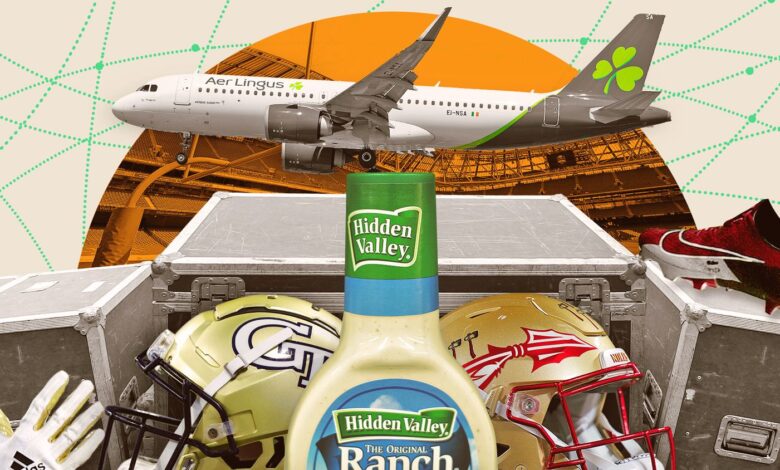Inside Florida State and Georgia Tech’s bold plans for season opener in Ireland

In preparation for Saturday’s game between Florida State and Georgia Tech, both schools spent 17 months creating spreadsheets, filling out documents and double-checking customs regulations to make sure they had packed everything they needed for the transatlantic trip.
Uniform? Yes.
Studded shoes? Yes.
Ranch dressing? Um, right?
Ramblin’ Wreck? Sadly, back to Atlanta.
Renegade, Osceola and their flaming spears? If only that pesky quarantine problem would be solved.
Even without their most iconic pregame traditions in Dublin, Florida State and Georgia Tech will head into Week 0 with everything they need to play football thanks to a comprehensive behind-the-scenes effort that Georgia Tech director of football operations Josh Thompson described as “not for the faint of heart.”
In total, the schools brought in 238 boxes weighing more than 40,000 pounds — packed and shipped on cargo planes last week — filled with everything from game-day gear to essential sports medicine supplies, protein powder, snacks like Goldfish and, of course, spices that aren’t available in Dublin.
“There’s no room for error here,” said Jason Baisden, Florida State’s assistant athletic director for equipment operations. “Once we’re there, we’re there. We can’t go back or call and say, ‘Hey, bring this with you.’”
Both schools began preparing for the game in March 2023, shortly after the announcement was made. Florida State football operations director Bruce Warwick has attended a number of overseas games during his previous stops in the NFL, so he has a good idea of what it would be like to move an entire team more than 4,000 miles away.
In addition to packing all the necessary gear, passports will need to be secured, multiple in-person visits to the team hotel (including food tastings) and communication with officials in Ireland must be precise. Nothing — like assuming an American biscuit and an Irish biscuit are the same — can be left to chance.
“I had to learn to speak their language,” Baisden said. “Like, to them, it wasn’t a uniform, it was a suit. It was English, but we had to make sure nothing got lost in the translation of what we were doing.” Baisden and Thompson called people they knew at Notre Dame and Navy, two schools that had previously played in Ireland. Baisden asked them for a household book, a document that facilitates temporary international imports and exports. The household book essentially lists every item brought into a foreign country line by line, with exact quantities.
Want to bring snacks for the team? No problem. But every snack, from applesauce to cookies, needs to be listed. Same goes for tape, gloves, protein powder. Want to bring them? You have to list them.
At Florida State, Baisden became the liaison between departments. In January, he asked the sports nutrition, sports medicine, creative video, weight training, broadcasting and sports information teams to begin identifying what they absolutely needed to bring.
He describes the process as preparing for “an overseas bowling trip.” But the detail that goes into listing everything goes far beyond any preparation for a bowling trip, where schools simply load their trucks and hit the road. For this trip, Baisden labeled each box with its intended use — hotel, practice, game.
International travel is why Ramblin’ Wreck and Renegade and Osceola were left at home. Irish officials have asked about their ability and both schools have had serious discussions about finding a way to make it happen.
Renegade, the legendary horse Osceola rides before every Florida State home game to plant a flaming spear in the middle of the field, will be quarantined on the way back to Tallahassee as required by international regulations, so the horse will not be available for the home opener against Boston College on September 2. Plus, it’s technically a Georgia Tech home game.
A 1930 yellow and white Ford Model A Sport Coupe called the “Ramblin’ Wreck” has led the Yellow Jackets onto the field for every home game since 1961. The Wreck had to travel by ship to Ireland, and the travel time home also meant it would not be available for the home opener against Georgia State on August 31. There was discussion of using an Irish “cousin” of the Wreck, a Peugeot-style replacement from Dublin, but the idea was rejected.
There’s a lot to negotiate to get there. Florida State ended up having to apply for 85 passports for its players; Georgia Tech had to apply for a total of 70 passports for players and staff. Perhaps the most surprising challenge teams face is making sure they can use the new technology allowed to start this season — communication between coaches and helmets and iPads on the sidelines.
The headsets coaches use on the sidelines in the United States don’t work overseas because they use different radio frequencies. Both schools had to lease new systems, which meant coaches had to get used to a different set of belts. Florida State practiced with them in practice games so coaches could get a feel for them.
Thompson said schools had to secure multiple frequency lines for the headsets to work. The iPads needed to be coordinated with Aviva Stadium and local vendors to get specific fiber lines that would be used to update the video in real time. Schools have been having weekly calls with the ACC and various vendors to make sure everything is ready. Everything will be tested on Friday.
“Coaches don’t like change. I don’t like change,” Thompson said. “People are creatures of habit. I want to walk into the stadium when the team walks in and make sure everything is done. I don’t want to be running around panicking, ‘Okay, how are we going to handle this?’”
The teams have been traveling through various airports to airlift their cargo, all under the guidance of Aer Lingus, the game’s primary sponsor. Last week, Florida State packed a truck to take it to Orlando, where its boxes were then placed on cargo plane pallets known as “cookie sheets” for international travel and then flown to Dublin. Georgia Tech flew its cargo to Chicago, and then to Dublin.
Everything that flew in arrived before the teams arrived on Thursday morning. Each team sent a team ahead to unpack the boxes and start sorting through the items for use at the hotel or stadium. Equipment managers set up their locker rooms for practice on Thursday. Additionally, both teams had hundreds of cases of Powerade and water bottles delivered directly to both the hotel and stadium.
The hotels were chosen because they resembled typical roadside hotels. They had to have ample space for team meetings, but also had to have food that tasted like home. Cornmeal, for example, was not popular because chefs couldn’t make it on demand, Warwick said. Florida State players loved ranch dressing, A1 steak sauce and Tabasco, which weren’t available in Ireland, so those particular condiments were prepackaged.
“The food is the biggest challenge because they like what they like and they know what they know,” Warwick says. “We try to keep it as Americanized as possible.”
The teams themselves left the United States on Wednesday night, but even their departures looked different. For domestic travel, both teams had to go through TSA security checks at their respective stadiums before boarding their buses and boarding their chartered flights.
But for an international trip, both teams have to go through the usual security lines at their respective airports. Florida State going through its small regional airport in Tallahassee is one thing. But imagine a 289-person Georgia Tech traveling party arriving at Concourse F at Hartsfield-Jackson International Airport in Atlanta and going through security.
Aer Lingus, the games’ main sponsor, had to get special permission to secure a gate. Thompson said he was assured that extra security lanes would be open so Georgia Tech could pass through efficiently. He plans to use a “pod system” in which he divides players into groups, with one group designated as a captain and responsible for making sure everyone has their passports.
Players will be regularly reminded of the dos and don’ts if they are carrying carry-on luggage, including the size of liquids allowed.
“I look forward to the day I’m the last person to go through the TSA line and see what’s been stolen in the meantime,” Thompson said.
Now picture this scene upon arrival: The players are standing around the baggage carousel, waiting for their player bags. Those bags have to travel with them, since both teams are practicing right up until departure day. So the bags are checked onto the plane upon arrival at the airport, to be picked up at baggage claim, in addition to their personal luggage. For this trip, Florida State has provided the players with custom-made wheeled suitcases. Both teams will have a light practice at the stadium upon arrival, with the main goal being to help everyone acclimate to the five-hour time change. Georgia Tech coach Brent Key, who traveled to Ireland for a game as a UCF assistant in 2014, said he doesn’t want the trip to be overwhelming — a lesson learned from his previous overseas experience.
“We overtrained those kids,” Key said, referring to UCF’s 26-24 loss to Penn State. “We tried to give them an experience. We took them to different places, we took them on tours, and there’s so much going on when you go there to play football. You know what makes a great experience? Winning.”
To that end, Georgia Tech will fly home after the game because of a tight schedule the following week. Since Florida State plays on Monday night, coach Mike Norvell decided to have the team stay on Sunday to visit before returning to Tallahassee.
While the approaches are different, the logistics of the buildup to the game are identical. The schools have been in constant communication, but there will be anxiety upon arrival, during, and after the game. Everything has to be packed for the trip home and at customs on Saturday night. In both cases — the travel to and from — both schools have had to rely heavily on people they’ve never met to get the job done.
“Every time I travel, I worry about whether my luggage is going to get there, so you definitely worry about that,” Thompson said. “You’re moving almost 300 people at once. So you just have to make sure it’s accurate and correct.”




